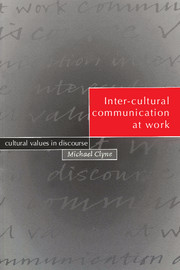Book contents
- Frontmatter
- Contents
- List of figures
- List of tables
- Acknowledgements
- 1 Introducing the field
- 2 Setting up the project
- 3 Speech acts in inter-cultural discourse
- 4 Variation in communication patterns and inter-cultural communication breakdown in oral discourse
- 5 Written discourse across cultures
- 6 Towards a linguistics of inter-cultural communication
- 7 Some theoretical and practical implications
- Appendix 1 Non-key informants
- Appendix 2 Index of informants' pseudonyms, ages, and ethnolinguistic background
- Appendix 3 Two long transcriptions
- References
- Index of text transcriptions
- Index of names
- Index of subjects
7 - Some theoretical and practical implications
Published online by Cambridge University Press: 05 June 2012
- Frontmatter
- Contents
- List of figures
- List of tables
- Acknowledgements
- 1 Introducing the field
- 2 Setting up the project
- 3 Speech acts in inter-cultural discourse
- 4 Variation in communication patterns and inter-cultural communication breakdown in oral discourse
- 5 Written discourse across cultures
- 6 Towards a linguistics of inter-cultural communication
- 7 Some theoretical and practical implications
- Appendix 1 Non-key informants
- Appendix 2 Index of informants' pseudonyms, ages, and ethnolinguistic background
- Appendix 3 Two long transcriptions
- References
- Index of text transcriptions
- Index of names
- Index of subjects
Summary
Opening remarks
In Chapter 6, I related discourse patterns observed in our corpus of inter-cultural communication to cultural values systems, and attempted to describe some principles of a linguistics of inter-cultural communication. This chapter has an even wider brief. I shall try to bring together various sets of conclusions in the book. This will lead to a discussion of some basic issues concerning language and the interrelation of language and culture. A number of models for language/culture contact will be contrasted, and an attempt will be made to develop a truly ‘multicultural’ one appropriate to the issues presented in this monograph. The remainder of the chapter will be devoted to consideration of practical implications of this field for communication practice, educational language policy, the management of a multicultural workplace, and the spin-offs in trade and other international communication.
Synthesis of conclusions so far
The discussion of the corpus drawn from Melbourne workplaces indicates the diversity and complexity of inter-cultural (and probably also intra-cultural) communication. Because of the limited corpus, the conclusions should not be afforded a wider validity than they deserve. The focus on the speech acts – apologies, commissives, complaints and whinges, and directives – shows that they are intertwined in complex interactions often containing several of them. This is obscured by discussion of single-utterance speech acts. It emerges that there is a close interaction between speech act realizations and turn-taking procedures.
Information
- Type
- Chapter
- Information
- Inter-cultural Communication at WorkCultural Values in Discourse, pp. 202 - 214Publisher: Cambridge University PressPrint publication year: 1995
